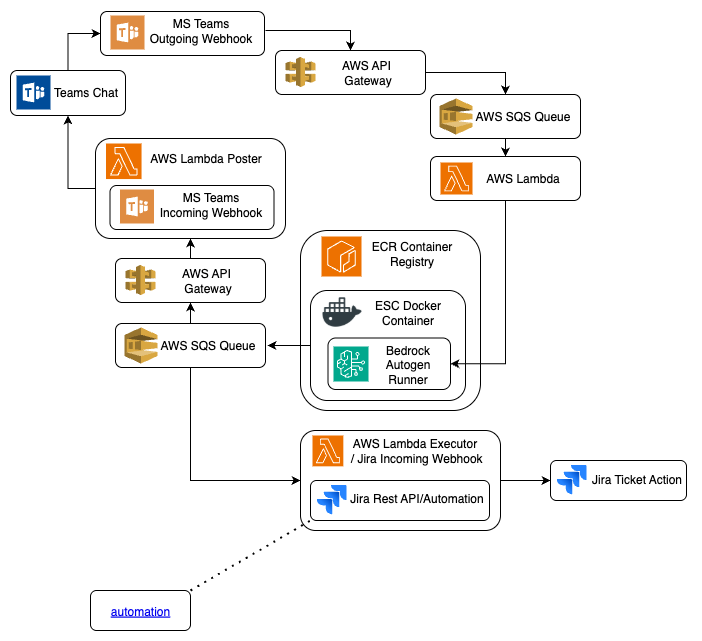Conversational IT Support Agent: a Global Cloud Content Management Platform

Challenge
Employees at a global cloud content management company faced a tedious and repetitive manual process for opening IT support tickets, requiring them to fill out a cumbersome web form. This created a poor user experience and consumed valuable time for both the employees and the IT team, who had to manually parse requests to create tickets.
Solution
A conversational IT support agent was developed and integrated into Slack. This AI-powered agent engages users in a natural conversation to understand their issues. It first attempts to guide them toward self-service solutions using internal documentation. If the problem persists, the agent conversationally gathers the necessary information and automatically creates a Jira support ticket on the user's behalf.
Benefits
The solution significantly enhances the user experience by providing instant, conversational support directly within Slack. It streamlines the ticketing process, saving the IT support team an estimated 15-20 hours per week. The automated agent eliminates the need for manual ticket creation from web forms and provides employees with a faster, more intuitive way to resolve issues or request help.
AWS Services
AWS Lambda, Amazon API Gateway, Amazon Simple Queue Service, Amazon Elastic Container Registry, Amazon Elastic Container Service, Amazon Bedrock
Executive Summary
A leading cloud content management and productivity software provider, identified a significant internal inefficiency that was impacting employee productivity and satisfaction. The existing process for obtaining IT support required employees to navigate to a separate website and complete a detailed, often repetitive, web form.
This manual system was not only time-consuming for the employee seeking help but also created a bottleneck for the IT department. The IT team had to dedicate valuable time to manually reviewing each submitted form, interpreting the request, and then creating a formal support ticket in their system. This two-step, human-dependent process was prone to delays, inconsistencies, and diverted skilled IT personnel from more strategic tasks.
The Challenge
The core problem was a manual, multi-step IT support ticketing process that involved two key human touchpoints.
- First, the employee needing assistance had to disengage from their work, access a web portal, and fill out a form that often included irrelevant questions for their specific issue. This led to frustration and lost productivity.
- Second, a member of the IT team had to manually process this incoming request to translate it into a structured Jira ticket. This manual intervention delayed the resolution process and consumed significant staff hours that could be better utilized for resolving the actual technical problems. The goal was to eliminate these manual steps, reduce the administrative burden on the IT team, and provide employees with a seamless and instantaneous way to get the help they need.
The Solution
To address these challenges, a sophisticated and automated solution was architected using a suite of AWS services. The centerpiece is a generative AI-powered conversational IT support agent, accessible directly through MS Teams.
The workflow is initiated when an employee starts a chat in a designated Teams channel. An MS Teams Outgoing Webhook sends the user's message to an AWS API Gateway endpoint, which triggers an AWS Lambda function. This Lambda function places the message into an Amazon SQS queue for reliable, asynchronous processing.
From the queue, another AWS Lambda function picks up the message and sends it to the core of the solution: a containerized application running on Amazon ECS. This container, managed via Amazon ECR, hosts the Bedrock Autogen Runner, which leverages the power of Amazon Bedrock to facilitate a natural, intelligent conversation with the user.
The AI agent first consults internal IT documentation and troubleshooting guides to offer potential self-service solutions. If self-service is unsuccessful, the agent transitions to a guided, conversational data-gathering process. Based on the nature of the problem, the agent asks a dynamic series of relevant questions.
Once all necessary information is collected, an AWS Lambda Executor function is triggered. This function interacts with the Jira REST API to automatically create a support ticket, populating it with the data gathered during the conversation. The agent then informs the user via an MS Teams Incoming Webhook that a ticket has been created and provides the ticket number, completing the loop without the user ever leaving their chat interface.

The Benefits
The implementation of the conversational IT support agent has delivered significant value to the customer by transforming a previously cumbersome process into a seamless and efficient workflow.
Enhanced Employee Experience
Employees now receive instant gratification and support directly within MS Teams. The frustrating experience of filling out web forms and waiting for a manual response has been replaced by an intuitive, conversational interface that makes them feel immediately heard and assisted.
Increased IT Efficiency
The automation of ticket creation has a substantial impact on the IT team's workload. By eliminating the need to manually parse requests and create tickets, the solution saves an estimated 15 to 20 hours of IT staff time per week. This allows the team to focus on higher-value tasks and proactive problem resolution rather than administrative overhead.
Streamlined Operations
The entire support process, from initial request to ticket creation, is now streamlined and automated. The agent ensures that all necessary information is collected upfront in a structured manner, leading to better quality tickets and faster resolution times.